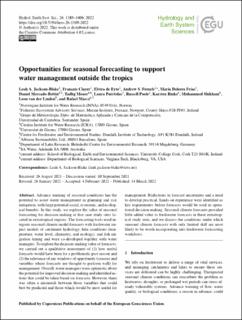| dc.contributor.author | Jackson-Blake, Leah Amber | |
| dc.contributor.author | Clayer, Francois | |
| dc.contributor.author | de Eyoto, Elvira | |
| dc.contributor.author | French, Andrew S. | |
| dc.contributor.author | Frías, María Dolores | |
| dc.contributor.author | Mercado-Bettín, Daniel | |
| dc.contributor.author | Moore, Tadhg | |
| dc.contributor.author | Puértolas, Laura | |
| dc.contributor.author | Poole, Russell | |
| dc.contributor.author | Rinke, Karsten | |
| dc.contributor.author | Shikhani, Muhammed | |
| dc.contributor.author | van der Linden, Leon | |
| dc.contributor.author | Marcé, Rafael | |
| dc.date.accessioned | 2022-03-24T12:02:13Z | |
| dc.date.available | 2022-03-24T12:02:13Z | |
| dc.date.created | 2022-03-15T12:25:40Z | |
| dc.date.issued | 2022 | |
| dc.identifier.citation | Hydrology and Earth System Sciences. 2022, 26, 1389-1406. | en_US |
| dc.identifier.issn | 1027-5606 | |
| dc.identifier.uri | https://hdl.handle.net/11250/2987338 | |
| dc.description.abstract | Advance warning of seasonal conditions has the potential to assist water management in planning and risk mitigation, with large potential social, economic, and ecological benefits. In this study, we explore the value of seasonal forecasting for decision-making at five case study sites located in extratropical regions. The forecasting tools used integrate seasonal climate model forecasts with freshwater impact models of catchment hydrology, lake conditions (temperature, water level, chemistry, and ecology), and fish migration timing and were co-developed together with water managers. To explore the decision-making value of forecasts, we carried out a qualitative assessment of (1) how useful forecasts would have been for a problematic past season and (2) the relevance of any windows of opportunity (seasons and variables where forecasts are thought to perform well) for management. Overall, water managers were optimistic about the potential for improved decision-making and identified actions that could be taken based on forecasts. However, there was often a mismatch between those variables that could best be predicted and those which would be most useful for management. Reductions in forecast uncertainty and a need to develop practical, hands-on experience were identified as key requirements before forecasts would be used in operational decision-making. Seasonal climate forecasts provided little added value to freshwater forecasts in these extratropical study sites, and we discuss the conditions under which seasonal climate forecasts with only limited skill are most likely to be worth incorporating into freshwater forecasting workflows. | en_US |
| dc.language.iso | eng | en_US |
| dc.publisher | Published by Copernicus Publications on behalf of the European Geosciences Union | en_US |
| dc.rights | Navngivelse 4.0 Internasjonal | * |
| dc.rights.uri | http://creativecommons.org/licenses/by/4.0/deed.no | * |
| dc.title | Opportunities for seasonal forecasting to support water management outside the tropics | en_US |
| dc.type | Peer reviewed | en_US |
| dc.type | Journal article | en_US |
| dc.description.version | publishedVersion | en_US |
| dc.rights.holder | © Author(s) 2022 | en_US |
| dc.source.pagenumber | 1389-1406 | en_US |
| dc.source.volume | 26 | en_US |
| dc.source.journal | Hydrology and Earth System Sciences | en_US |
| dc.identifier.doi | 10.5194/hess-26-1389-2022 | |
| dc.identifier.cristin | 2009922 | |
| dc.relation.project | Norges forskningsråd: 274208 | en_US |
| cristin.ispublished | true | |
| cristin.fulltext | original | |
| cristin.qualitycode | 2 | |

